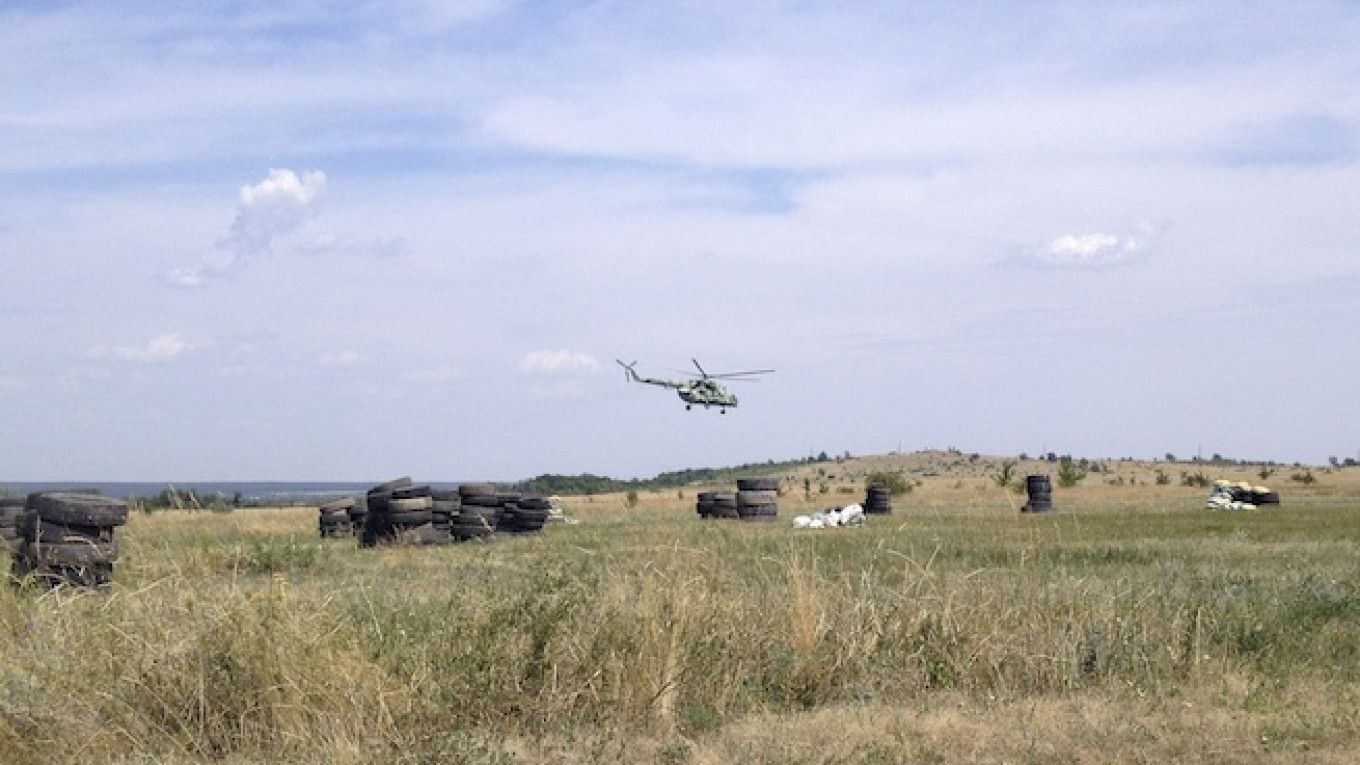VERKHNYAYA OREKHOVKA — In Russia's southwestern Rostov region bordering Ukraine, a military-style training camp, a broken down border fence and tracks consistent with armored personnel carriers or tanks add to a body of evidence of Russian involvement in Ukraine's war.
The Kremlin has consistently denied assertions by the West that it is arming, supporting and training separatists fighting to establish an independent state in eastern Ukraine.
U.S. officials said in July they had identified a separatist training facility near Rostov, and a surface-to-air rocket that turned up in east Ukraine in June originated from a base near Moscow, according to its logbook.
On Russia's border with Ukraine, some 170 kilometers north of Rostov, there is further evidence pointing to Russia's role in the insurrection.
A gap a few meters wide has been cut in the razor-wire fence opening a route for vehicles and pedestrians to the rebel-controlled area of eastern Ukraine.
On the Russian side of the divide, a track leads towards the Russian town of Donetsk, 1 kilometer away and bearing the same name as the rebel stronghold in Ukraine. The soil has the imprints of caterpillar treads, the kind used on tanks or some types of armored personnel carriers.
When a reporter visited this section of border in late July and early August, two Russian border guards emerged from bushes and waved them away. "It's better not to drive here," one said.
The guards denied that armored personnel carriers or tanks had crossed into Ukraine along the rough track.
A kilometer away, on the outskirts of the Russian town of Donetsk, caterpillar treads have left white marks on the roadside.
Unmarked Camp
The trail continues several kilometers along the Seversky Donets river to an area where a military camp and training ground is hidden from the road by trees, between the village of Malaya Kamenka and the town of Kamensk-Shakhtinsky.
No identifying flags or signs marked the camp.
Its entrance was blocked by "hedgehog" anti-tank obstacles and guarded by three uniformed men without insignia. An armored personnel carrier was parked in a nearby trench, covered with a camouflage net, another was hidden in bushes nearby.
"It is a camp. Exercises are going on," one of the men said.
Russia denies the existence of training camps for Ukraine separatists. A spokesman for the border guard, Vasily Malayev, said the camp in question was a border guard unit.
In late July armored personnel carriers and a military truck were seen moving through the camp. Two cars drove away carrying men in camouflage T-shirts.
One of the cars had the regional code 95 on its plates, generally associated with Chechnya, the other bore the code 15, associated with North Ossetia. A car stripped of its plates — a tactic used by rebels in Ukraine — drove into the camp.
Malayev, the border guard spokesman, said no armored cars had crossed into Ukraine.
"This is an agricultural area and traces of caterpillars do not necessarily mean tank maneuvers. A tractor may have gone there."
He said the gap in the fence was designed for local residents. "People have their dachas there. They go to their dachas. Residents have passes to go in that direction. They don't drive there, they only walk."
Ukraine said on Monday that Russia had amassed 45,000 troops on its border backed by heavy equipment including tanks, missile systems, warplanes and attack helicopters.
Residents of the Russian town of Donetsk confirmed seeing armored cars in town. A reporter saw dozens of Russian military trucks on highways around Rostov, including one carrying a tank.
A Message from The Moscow Times:
Dear readers,
We are facing unprecedented challenges. Russia's Prosecutor General's Office has designated The Moscow Times as an "undesirable" organization, criminalizing our work and putting our staff at risk of prosecution. This follows our earlier unjust labeling as a "foreign agent."
These actions are direct attempts to silence independent journalism in Russia. The authorities claim our work "discredits the decisions of the Russian leadership." We see things differently: we strive to provide accurate, unbiased reporting on Russia.
We, the journalists of The Moscow Times, refuse to be silenced. But to continue our work, we need your help.
Your support, no matter how small, makes a world of difference. If you can, please support us monthly starting from just $2. It's quick to set up, and every contribution makes a significant impact.
By supporting The Moscow Times, you're defending open, independent journalism in the face of repression. Thank you for standing with us.
Remind me later.


